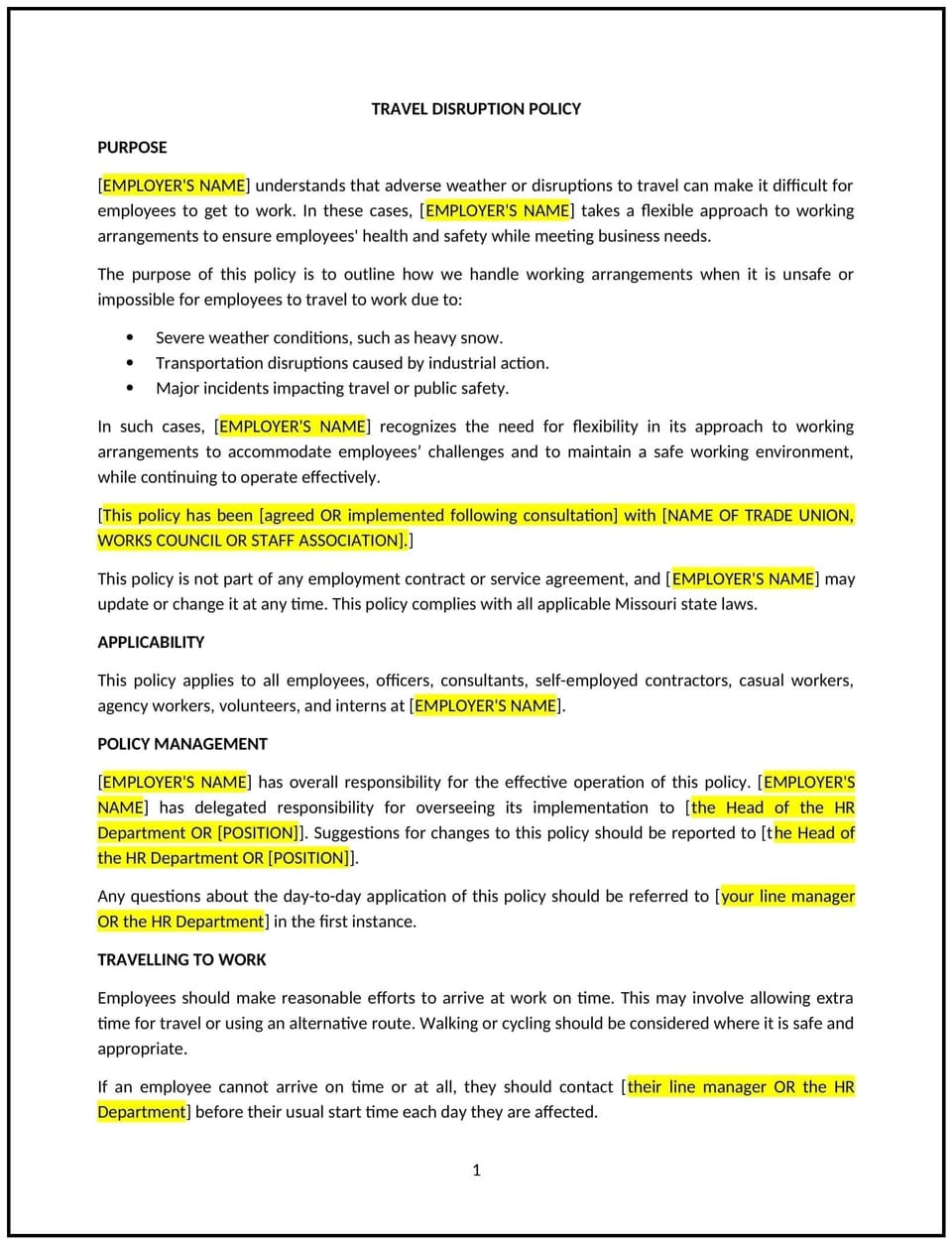Travel disruption policy (Mississippi): Free template

Travel disruption policy (Mississippi)
A travel disruption policy helps Mississippi businesses prepare for and respond to unexpected events that may affect employee travel. This policy outlines procedures for managing disruptions such as flight cancellations, severe weather, or other emergencies that impact business-related travel. It is designed to promote safety, reduce stress for employees, and provide clear guidelines for handling unforeseen circumstances while traveling.
By implementing this policy, businesses in Mississippi can ensure continuity of operations, demonstrate care for employee well-being, and align with the state’s emphasis on resilience and preparedness.
How to use this travel disruption policy (Mississippi)
- Define travel disruptions: Clearly specify what constitutes a disruption, such as flight delays, cancellations, natural disasters, or health emergencies.
- Establish communication protocols: Outline how employees should report disruptions and whom to contact for assistance.
- Provide emergency contacts: List key personnel or departments responsible for addressing travel disruptions and offering support.
- Address accommodation and transportation: Explain how the business will assist employees in finding alternative lodging or transportation during disruptions.
- Include health and safety measures: Specify steps employees should take to ensure their safety during disruptions, such as following local advisories or seeking medical attention if needed.
- Communicate the policy: Share the policy with employees through handbooks, emails, or training sessions to ensure awareness and understanding.
- Monitor implementation: Regularly review how the policy is applied and address any concerns or inconsistencies promptly.
- Update the policy: Periodically assess the policy to reflect changes in travel trends, risks, or operational needs.
Benefits of using this travel disruption policy (Mississippi)
This policy offers several advantages for Mississippi businesses:
- Promotes safety: Clear guidelines help protect employees during unexpected travel disruptions.
- Reduces stress: Providing a framework for handling disruptions minimizes uncertainty and anxiety for employees.
- Supports continuity: A well-defined policy ensures business operations can continue despite travel challenges.
- Builds trust: Demonstrates the business’s commitment to employee well-being and preparedness.
- Aligns with local values: Reflects Mississippi’s focus on resilience and community support.
- Improves planning: Helps businesses anticipate potential disruptions and develop proactive solutions.
- Enhances reputation: A robust policy showcases the business’s dedication to ethical and responsible practices.
Tips for using this travel disruption policy (Mississippi)
- Communicate clearly: Ensure employees understand the policy by providing written materials and discussing it during meetings or training sessions.
- Train managers: Educate supervisors on how to handle travel disruptions and support employees effectively.
- Use technology: Leverage tools like travel management apps or emergency alert systems to stay informed about disruptions and communicate with employees.
- Be flexible: Allow for reasonable accommodations, such as extending travel durations or rebooking flights, to address disruptions.
- Stay informed: Keep up with travel advisories, weather updates, and other relevant information to anticipate potential disruptions.
- Encourage preparedness: Advise employees to pack essentials, carry emergency contacts, and familiarize themselves with local resources before traveling.
- Review periodically: Assess the policy’s effectiveness and make updates as needed to reflect changes in travel risks or business needs.
Q: Why should Mississippi businesses adopt a travel disruption policy?
A: Businesses should adopt this policy to promote safety, reduce stress for employees, and ensure continuity of operations during unexpected travel disruptions.
Q: What types of disruptions should be included in the policy?
A: Businesses should include common disruptions such as flight delays, cancellations, severe weather, natural disasters, health emergencies, or political unrest.
Q: How should businesses communicate during a travel disruption?
A: Businesses should establish clear communication channels, such as designated contacts or emergency hotlines, and encourage employees to report disruptions promptly.
Q: What support should businesses provide during disruptions?
A: Businesses should assist employees in finding alternative lodging, transportation, or medical care and provide guidance on staying safe during the disruption.
Q: How can businesses prepare for potential disruptions?
A: Businesses should monitor travel advisories, maintain a list of emergency contacts, and train employees on responding to disruptions effectively.
Q: Should businesses cover additional costs caused by disruptions?
A: Businesses should consider reimbursing reasonable additional costs, such as rebooking fees or extended lodging, to support employees during disruptions.
Q: How often should businesses review the policy?
A: Businesses should review the policy annually or whenever there are significant changes in travel risks, business needs, or operational requirements.
This article contains general legal information and does not contain legal advice. Cobrief is not a law firm or a substitute for an attorney or law firm. The law is complex and changes often. For legal advice, please ask a lawyer.


